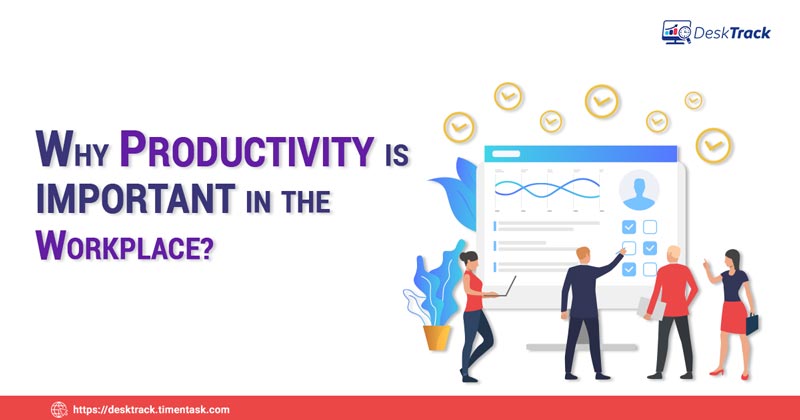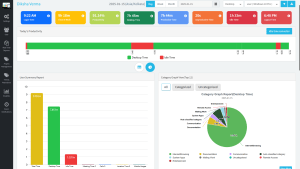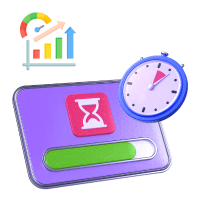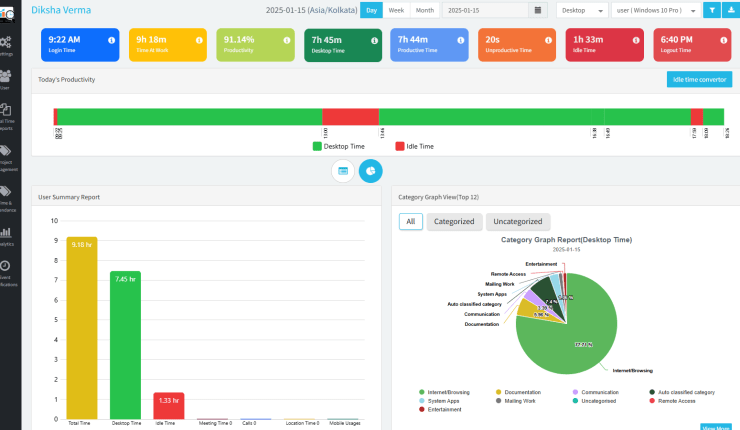Productivity is an ongoing trendy topic holding a strong position in business growth and development. Therefore, it is essential to know the importance of employee productivity in the workplace. Or how productivity can help businesses to grow more? Or how beneficial are workplace productivity tools for employees and companies? There are a lot of questions that arise when it comes to productivity. However, productivity enhancement is the most prominent challenge businesses overlook globally.
As per the analysis of The Engagement Institute, U.S. companies cost up to $550 billion annually because of missing workplace productivity.
Therefore, knowing more about productivity and its importance is worthwhile for every kind of business. Also, being productive can help the business boost and help employees work with better engagement and focus because satisfied and fit workers are the base of a thriving association. Productive companies function better to produce profits and manage to stay long in the market.
So, with the help of this blog, we’ll be going to let you know about the basics of productivity and the importance of productivity and helpful information to help you make a thriving productivity management system at your workplace.
What is Productivity?
The word “productivity” has been used in many ways by different people. Some believe that productivity is a measure of efficiency. Others believe it is a measure of effectiveness. Still, others believe it’s a measure of effectiveness and efficiency combined. The most useful definition of productivity is the ability to produce more output per unit of input. In other words, being productive means being able to get more done with less time or effort. In spite of the fact that productivity comes in various forms, let’s examine what they are:
Types of Productivity?
It is generally accepted that productivity is divided into two categories, namely “Personal Productivity” and “Economic Productivity“.
1. Personal Productivity
The ability to increase your output in a particular area of life, such as work, relationships, and family, is called Personal Productivity. It’s a type of productivity that’s focused on increasing your own personal output. It’s also called self-management or self-direction. A person who is high in personal productivity is one who manages his or her time well and gets more done than others because he or she works efficiently and effectively.
2. Economic Productivity
Over time, economic productivity is the rate at which an economy generates more economic value. Economic productivity is measured as real GDP per unit of labor input (technological progress). The increase in economic productivity is the balance between capital accumulation and technological innovation. Let’s examine the types of productivity in economics.
- Workforce Productivity
As a measure of the output of an economy, workforce productivity refers to the number of goods and services produced per hour by an employee. A variety of different types of productivity can be measured, including hourly production, total factor productivity, and multifactor productivity. As a measure of overall economic performance, workforce productivity is often compared to the business cycle.
- Sector Productivity
The sector productivity is the average productivity of all firms within a sector. The total output of all businesses within a sector is divided by the number of hours worked to produce one unit of output to determine the sector’s productivity.
- Team or Department Productivity
Group or organizational productivity refers to Team or Department Productivity. The concept of team productivity is not new. It has been around for quite some time. But it is likely to become even more relevant in the future as organizations try to increase their collective output. Team productivity can be measured by several different measures, including:
Productivity Per Worker – The amount of output produced by each worker in a team or department
Total Employee Compensation – The total amount paid to employees in a particular unit
Total Employee Hours Per Year – The total number of hours worked by employees in a given period of time
- National and Global Productivity
National productivity is the total output of a nation, measured in terms of gross domestic product (GDP). A country’s economy is said to be more productive if it generates more wealth than it consumes. To put it another way, national productivity is the number of goods and services produced in a nation per hour of labor by the typical worker.
Global productivity is a measure of how much wealth can be produced by each hour worked in one country. Global productivity is usually measured as a percentage of global GDP. The higher the percentage, the greater the global economic output per hour worked.
What is Productivity in the Workplace?
Productivity in the workplace is a tricky thing to define. If you’re not productive, then you’re not making enough money. But what is workplace productivity? There are really two kinds of Productivity in the Work:
- How much time it takes to get something done
- How much value is created by your work
Workplace Productivity Means utilizing the resources with an appropriate approach for generating better revenue. Employee productivity leads to better outcomes and can only be possible when they operate on time and with complete enthusiasm.
Therefore, the best productivity monitoring software helps managers to have the complete tab of their employees working throughout the day. Mainly, workplace productivity means the hours spent by employees on their work. Here is how you can calculate your workforce productivity:
Productivity = (value of work)/(employee time, effort)
It is all about the processing, the quality of work done, maintaining engagement and focus by dodging distractions and accomplishing assignments up to a specific deadline.
What is Productivity Measurement?
Productivity measurement is the practice of measuring the productivity of individuals, teams, and organizations. Productivity is measured in terms of output per unit of time spent on various tasks. In this context, “output” refers to actual results achieved by an employee or team member while “time” refers to the amount of time that was invested in completing each task.
When comparing current performance with past performance or comparing current performance with management expectations. Productivity measurement software can be used to evaluate the effectiveness of employees and managers. This blog helps you to calculate your Employee Productivity and performance- How to Calculate Employee Productivity
Why is Productivity Important in the Workplace?
Taking the question, Why is productivity important in a business? The main goal is to generate profit by producing more than what was required. Additionally, it helps in several other areas, such as:
1. Reduced Stress
A stress-free way of living is one that is productive and healthy. Stress can result in ill health, insomnia, and decreased productivity. Regular exercise is one technique to lower stress. You utilize less surplus energy and resources to complete your activities when you are more productive. Being productive at work has a direct impact on lowering stress levels and preventing overburden.
2. Improved Sense of Purpose
The main benefit of productivity is an improved sense of purpose. If you have a clear and well-defined purpose, then you are more likely to be happy and engaged with your work.
Our capacity to be productive is fundamentally based on our sense of purpose. Without it, we could feel like we are just going through the motions, yet we are unable to maximize our time without a strong sense of purpose.
3. Improved Well-Being
Your productivity may have a positive impact on your general health and well-being. The secret to happiness and success in life is productivity. You’ll have more time to take care of your health and mind if you spend less time on your tasks. It has a significant impact on an employee’s ability to perform successfully at work, pay, and level of job satisfaction.
4. Engagement With Work
Good productivity increases your level of commitment to your task. Productivity is important because it helps in engagement with work. It is closely related to efficiency and effectiveness in performing tasks, but it also has other important uses. It can be used as an indicator of performance, it can be used as an indicator of worker satisfaction, and motivation, and can help motivate workers to increase their productivity.
5. More Sustainability
Productivity is important because it helps in more sustainability. If you are a business owner, you should know that productivity can help in more efficiency and better profits. Productivity is vital since it will enable you to attract more clients, which will increase sales. So, here you’ll be going to find out how the COVID-19 pandemic changed productivity for many businesses.
As many companies have turned to working from home, employees spend 12% shorter periods in lengthy meetings and 9% more time dealing with clients. That helped in a growth of 47% in overall productivity up to some US businesses.
Workplace Productivity provides clear insights into the growth and health of businesses. Businesses that stay productive constantly lead to development and can easily deliver new services and possibly lower expenses.
Benefits of Productivity in the Workplace
The importance of productivity in the workplace plays an essential role as it helps employees stay productive, and the more productive they will be while working, the more advantages the company will have. So, here you’ll get to know the benefits of productivity in the Workplace and business.
Get the Team Together
Equality leads to better management no matter if it is in personal or professional life. And in companies, if a team is working together as per their allocated tasks and roles, and responsibilities, then the complete procedure will execute more effectively. Likewise, if the employees are efficiently performing their given tasks on time, then it will enhance team morale and make them more comfortable in their work.
Benefits for Customers
Productivity enhancement benefits customers by making employees more available for their services. Therefore, if the employees are working while being productive, then the quality of their work and the time utilized to complete it will improve. And the same procedure will help you provide better customer service and maintain long-term relations with them.
Reduced Business Costs
When your employees are productive and indulge in completing their work on time, at time, they accomplish their tasks before the deadlines, which means they have more time to pay for other assignments. Therefore, this improves the result and saves you money.
Reaching Objectives
When the team leaders keep a tab of every activity and help the workforce to be productive and committed to their work, then both the quality and amount of their assignments will be enhanced. Therefore, this will help you reach objectives on time.
Boosts Competency
When your employees stay productive, they deliver operations fast and help your company stand out of the box in the market, as this creates smoothness and transparency among customers. So, this process helps companies to be competitive in the market.
Benefits of Increased Productivity for Businesses
Effective Utilization of Resources
When a business is more productive and efficient, it can have a significant effect on its profitability. In order for a product or service to be profitable, productivity is an important factor.
When a business produces more with fewer resources, it will be more profitable than when it produces less with more. When a company is able to produce more while using fewer employees, it can reduce costs and increase profits.
Better Quality Assured
You can improve the quality of your business by increasing productivity. The reason for this is that you can accomplish more in less time with it. Suppose you have a three-month software development project. However, if you can complete the task in half the time, you will save money on labor costs, and the Quality Assured will also be improved since it will be completed more quickly.
Fundamental Measurements of Productivity That Impact
Here are some fundamentals of productivity measurement:
Finances
If you are running an organization, then you have to maintain and manage all the business-related things on your own for better outcomes. Likewise, managing workplace productivity in work is essential for a better work culture. So, if any of your employees stay unproductive for a long time continuously for a week or month, it will definitely impact the business.
But what can be the reason for unproductivity in an organization? And the answer is poor management, lack of skills, or proper tools for the workforce to accomplish their allocated tasks.
However, providing the training sessions to employees periodically and streamlining the best practices to keep employees engaged and focused on their work, aiding productivity and profiting the company’s finances.
Customers
It is not easy for every business to maintain good relationships with their customers, as this can only be done by those who provide services on time, accurately, and with minimum difficulties or delays. Employees who stay productive in their work can make this happen, and this helps them create new relations by praising communication in the market based on the knowledge they deliver to others.
So, when employees are working productively, it leads to positive impacts from customers, which helps businesses bring more profit. Because of better productivity, employees utilize their time with a proper schedule meaning more work is accomplished in less time.
Time
The achievement of employee tasks or projects is not only dependent on their work performances or processing but also depends on the techniques the company uses for accomplishing the same. Therefore, the improvement in productivity leads to saving time by which employees can work for other allotted work. It leads to more work in less time that will help employees further, such as planning and creating work strategies and using employee time tracking software for the future. Improved workplace productivity in work helps employees to work in a pattern and maintain proper strategies for better results.
Morale
To create a better work environment, companies should maintain morale and productivity as they both play an important role in better management. When morale goes down, productivity reacts the same and vice versa. Therefore, establishing a proper method that raises morale is the best way to hold adequate productivity levels.
If employees achieve their goals in their fixed time they feel motivated, and if the same does not work right, it can make them feel stressed and frustrated towards completing their work. Using an operating strategy that helps them stay productive so they can finish their work is a method to enhance business morale.
Common Productivity Problems in Management
Meet the common productivity problems in management. These can affect your business and your lifestyle. Below are a few problems that commonly affect productivity.
1. No Direction
One of the most common productivity problems in management is a lack of direction. It involves a lack of clear and concise direction from top management on what needs to be done and when it needs to be done, as well as a lack of cooperation between departments.
2. Employee Disengagement
There is employee disengagement when employees do not feel that they are working towards a common goal and are not engaged in their work. This can lead to a number of problems, including lower productivity, lower morale, and increased turnover. Employee disengagement can affect both your business’s bottom line and its employees’ happiness. Employee engagement activities at work can reduce it.
3. Excessive Meetings
It is possible to use meetings to get work done as well as inform people about the progress of various projects. However, when meetings begin to happen without a purpose or agenda, they become an unnecessary waste of time and money.
4. Ineffective Performance Management
It is common for performance management to be ineffective. Ineffective performance management can be defined as the failure to effectively manage employee performance or the failure to use performance management processes that effectively manage employee performance.
5. Poor Work-Life Balance
There is an issue of work-life balance in every workplace, but it is especially important for managers. They have to be present at work and engage with employees, so it’s important that they are able to do both. However, when managers try too hard to maintain a good work-life balance, it can lead to burnout and poor performance. If your manager is overstretched, then he or she may find it difficult to manage everything effectively. This can lead to conflict within the team, decreased productivity, and even staff turnover as people feel undervalued.
How to Improve Productivity?
Productivity is an important factor in building and maintaining a successful business. In order to increase your productivity, you must understand how to improve it. There are many different ways to accomplish this and one of the most popular ways is through using lists.
1. Keep Things Simple
A lot of people struggle with the idea of being more productive. As a result, they think that they have to do more, work harder, or manage their time better.
But what if there was an easier way? Wouldn’t it be great if you could improve your productivity without doing anything? The truth is that there is a simple way to improve your productivity — and it’s one of the most powerful tools available to anyone who wants to get things done.
2. Set Reminders
Reminders are the best way to ensure you stay on track with your goals. With reminders, you can set tasks that you want to complete, and give yourself a time period in which to do them. These reminders will help keep you organized, and ensure that you don’t forget about important things.
3. Review Goals Daily
It’s easy to forget about your goals when you’re busy with other projects, but it’s crucial to review them on a regular basis. How can you possibly reach your destination if you don’t know where you’re going? Reviewing your goals daily will help ensure that you aren’t off-track and doing things for the wrong reasons.
4. Minimize Time-Wasting Activities
The first step to improving productivity is to identify your time-wasting activities. Once you know what they are, you can decide how best to reduce them. The key is to minimize activities that don’t contribute much value and maximize those that do.
5. Use Productivity Apps
The number of productivity apps available is growing. There are many ways to become more productive, but some apps have proven themselves to be the best. To start, you should try using a DeskTrack to enhance your employee productivity, which can help you organize your tasks and prioritize them in a way that makes sense to you.
Conclusion
Productivity in the workplace is a necessary aspect that every company should have command of. Improvement in productivity leads to better work management, helps employees work in less time, and brings better outcomes.
We hope you have comprehended the meaning and importance of productivity in the workplace through this blog. So, try to improve your overall workforce productivity for better results and revenues and make your business grow in every aspect.
















